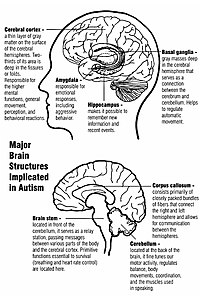
Sleep patterns predictive of daytime challenging behavior in individuals with low‐functioning autism
Sign Up to like & getrecommendations! Published in 2018 at "Autism Research"
DOI: 10.1002/aur.1899
Abstract: Increased severity of problematic daytime behavior has been associated with poorer sleep quality in individuals with autism spectrum disorder. In this work, we investigate whether this relationship holds in a real‐time setting, such that an… read more here.
Keywords: sleep patterns; autism; functioning autism; challenging behavior ... See more keywords

Assessment and treatment of high-risk challenging behavior of adolescents with autism in an aquatic setting.
Sign Up to like & getrecommendations! Published in 2019 at "Journal of applied behavior analysis"
DOI: 10.1002/jaba.590
Abstract: Aquatic-based activities produce positive skill and health benefits for individuals with Autism Spectrum Disorder (ASD); however, aquatic contexts, such as the pool, introduce the risk of injury and drowning. This risk is heightened when individuals… read more here.
Keywords: risk; treatment high; high risk; challenging behavior ... See more keywords

Extending functional communication training to multiple language contexts in bilingual learners with challenging behavior.
Sign Up to like & getrecommendations! Published in 2021 at "Journal of applied behavior analysis"
DOI: 10.1002/jaba.883
Abstract: Little research has highlighted how evidence-based practices (e.g., functional communication training [FCT]) might be adapted for bilingual learners with disabilities. In the current study, we served 2 children with autism spectrum disorder (ASD) and challenging… read more here.
Keywords: functional communication; training; challenging behavior; language contexts ... See more keywords

Description and evaluation of a function-informed and mechanisms-based framework for treating challenging behavior.
Sign Up to like & getrecommendations! Published in 2022 at "Journal of applied behavior analysis"
DOI: 10.1002/jaba.940
Abstract: Individualization and iterative design are essential components of the assessment and treatment of challenging behavior. Currently, there are few validated frameworks for engaging in iterative processes. Due to the nature of single-case design, empirically rigorous… read more here.
Keywords: informed mechanisms; mechanisms based; framework; challenging behavior ... See more keywords

A Meta-analysis of Challenging Behavior Interventions for Students with Developmental Disabilities in Inclusive School Settings
Sign Up to like & getrecommendations! Published in 2020 at "Journal of Autism and Developmental Disorders"
DOI: 10.1007/s10803-019-04329-x
Abstract: Challenging behavior is a significant barrier in accessing the general education curriculum for students with developmental disabilities. This necessitates the identification of evidence-based practices for addressing challenging behavior in inclusive settings. The purpose of our… read more here.
Keywords: disabilities inclusive; students developmental; challenging behavior; developmental disabilities ... See more keywords

Reducing Escape without Escape Extinction: A Systematic Review and Meta-Analysis of Escape-Based Interventions
Sign Up to like & getrecommendations! Published in 2021 at "Journal of Behavioral Education"
DOI: 10.1007/s10864-021-09453-2
Abstract: Individuals with disabilities may engage in challenging behavior to escape aversive stimuli, like academic tasks or non-preferred foods. Interventions to reduce these behaviors often employ escape extinction; that is, the implementer withholds escape following challenging… read more here.
Keywords: escape; escape based; challenging behavior; escape extinction ... See more keywords

Adverse Side Effects of Psychotropic Medication and Challenging Behavior: Pilot Work Assessing Impact
Sign Up to like & getrecommendations! Published in 2017 at "Journal of Developmental and Physical Disabilities"
DOI: 10.1007/s10882-017-9570-0
Abstract: Psychotropic medications are often prescribed to reduce challenging behavior in individuals with intellectual and developmental disabilities (IDD). Functional analyses (FAs) have demonstrated utility in assessing medication impact on behavior; however, the impact of adverse side… read more here.
Keywords: adverse side; methodology; impact; challenging behavior ... See more keywords

A Review of School-Based Interventions to Reduce Challenging Behavior for Adolescents with ASD
Sign Up to like & getrecommendations! Published in 2019 at "Journal of Developmental and Physical Disabilities"
DOI: 10.1007/s10882-018-9626-9
Abstract: A systematic review was conducted to assess the types of school-based interventions commonly used for adolescents (10 to 21 years) to reduce challenging behavior. A total of 40 articles were identified through the database search and… read more here.
Keywords: school based; within school; challenging behavior; reduce challenging ... See more keywords

Managing challenging behavior in people with intellectual disabilities in communities and reducing hospital stays: Current and future challenges from an European perspective
Sign Up to like & getrecommendations! Published in 2017 at "European Psychiatry"
DOI: 10.1016/j.eurpsy.2017.01.928
Abstract: Prevalence of intellectual disability (ID) ranges from 0.05 to 1.55%. A total of10–15% of the people with ID present with challenging behavior (CB). This causes a significant strain on mental health services. People with ID;… read more here.
Keywords: specialist services; health services; challenging behavior; services people ... See more keywords

Comorbid Feeding and Gastrointestinal Symptoms, Challenging Behavior, Sensory Issues, Adaptive Functioning and Quality of Life in Children and Adolescents with Autism Spectrum Disorder
Sign Up to like & getrecommendations! Published in 2020 at "Developmental Neurorehabilitation"
DOI: 10.1080/17518423.2020.1770354
Abstract: ABSTRACT Aim Children and adolescents diagnosed with an autism spectrum disorder (ASD) often demonstrate difficulties with feeding. The goal of the current study was to investigate co-occurring issues that often accompany feeding problems in 120… read more here.
Keywords: symptoms challenging; quality life; gastrointestinal symptoms; sensory issues ... See more keywords

Toward data-based clinical decision making for adults with challenging behavior using the Behavior Problems Inventory-Short Form (BPI-S)
Sign Up to like & getrecommendations! Published in 2018 at "Tizard Learning Disability Review"
DOI: 10.1108/tldr-06-2017-0025
Abstract: Purpose The Behavior Problems Inventory-Short Form (BPI-S) is a shorter version of the Behavior Problems Inventory-01. In this paper, BPI-S population norms are reported from a total administrative population of adults with intellectual disability (ID).… read more here.
Keywords: change; problems inventory; challenging behavior; bpi ... See more keywords